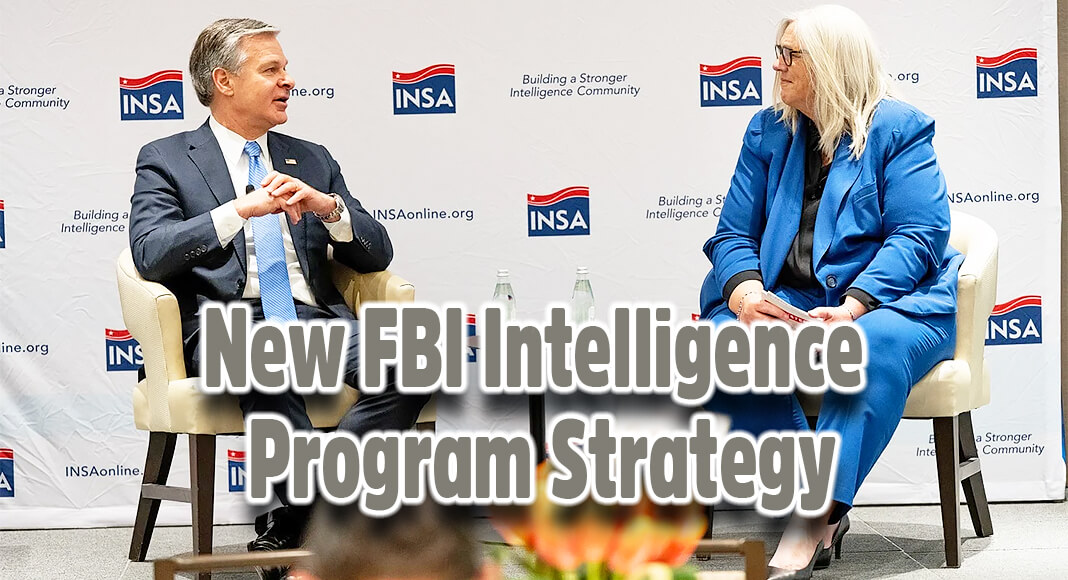
Texas Border Business
Federal Bureau of Investigation
FBI Director Christopher Wray today outlined the Bureau’s new intelligence program strategy and emphasized how partnerships, collaboration, and innovation are essential to combatting emerging national security threats.
“Our ability to collect intelligence that illuminates threats, to act on that intelligence here in the United States, and to share that intelligence with private companies, law enforcement, the IC, and foreign partners empowers all of us to take the joint action we need to have the greatest impact against the threats we face,” Wray said at the Intelligence and National Security Alliance summit on February 29 in McLean, Virginia. The annual summit brings together public, private, and academic sectors to find practical and creative solutions to national security challenges.

The FBI’s role as a law enforcement agency and member of the Intelligence Community (IC) is “tailor made for today’s challenges,” Wray said. The new five-year strategy will drive the FBI’s intelligence program by leveraging technology, tradecraft, and training to combat the global and complex threats facing the United States.
Technology, Wray emphasized, is key to addressing a shifting threat environment. Investigations can yield an overwhelming amount of data, and it’s essential that the FBI’s intelligence workforce is prepared with knowledge and tools that allow for efficient analysis and important innovation.
“Just one investigation of a cyber intrusion could bring in terabytes of data,” Wray said. “And we have to quickly distill that information so we can find the needle in an ever-growing haystack.”
The Director was joined by Sue Gordon, former principal deputy director of national intelligence at the Office of the Director of National Intelligence. They discussed the challenges the FBI and the greater IC face when it comes to evolving technology, especially the emergence of artificial intelligence—or AI—and new technological capabilities that adversaries can exploit.
Wray acknowledged that our “sophisticated adversaries use AI to increase the speed and skill” of their efforts. He noted that the FBI can do great things by leveraging emerging technologies, but those same technologies also pose a threat in the hands of adversaries. The FBI is focusing on defense and on the importance of collaboration and innovation to protect the American people.
Wray also highlighted the indispensable tools the FBI leverages to combat threats posed to the U.S., including Section 702 of the Foreign Intelligence Surveillance Act. He called it the “most important tool we have to protect Americans from foreign threats.” Section 702 allows the government to conduct targeted surveillance of foreign persons located outside of the U.S. and can be used to prevent terrorism, cybercrimes, and more. And, when dealing with overwhelming amounts of data and high-speed cases, the FBI’s capability to lawfully collect information and subsequently search and analyze that information is essential in timely investigations.
“Time matters,” Wray said.
Tradecraft is another pillar of the FBI’s intelligence program strategy. It focuses on the recruitment and operation of sources and resilience in the face of emerging threats like ubiquitous technical surveillance, a term the FBI uses to describe how adversaries can threaten Bureau personnel, sources, and operations through the widespread collection and analysis of digital activities.
Tradecraft also includes the authorship and distribution of critical analysis. The new strategy emphasizes the FBI’s responsibility to deliver impactful analysis to intelligence partners, strengthening connections and collaboration. Quoting a former CIA analyst, Wray said, “It’s tradecraft and proper coordination that turn one individual’s analysis into an IC product we can all stand behind.”
The third lever of the strategy—training—focuses on fostering a multidisciplinary approach to the FBI’s work that highlights the integration of intelligence and operations. This training will give employees the skills they need to form multidisciplinary teams, utilizing the expertise of every job role to ensure the FBI is applying their full range of authorities and capabilities to all they do.
“We’ll train our new agents as collectors and consumers of intelligence, as well as investigators,” Wray said.
Wray spoke on the Bureau’s role in the IC, particularly the FBI’s unique combination of law enforcement and intelligence authorities—an asset, he said, that can bridge many of the gaps our enemies want to exploit. To do so, collaboration is key.
“Defending against evolving threats requires all of us,” Wray said, citing cybercrime, terrorism, counterintelligence, and election security among the emerging threats. The FBI’s response is “fast, coordinated, and skillful as ever” thanks to increased coordination and collaboration with our partners, including those in local law enforcement and the private sector.
“It’s never been more important than it is right now,” Wray said.















